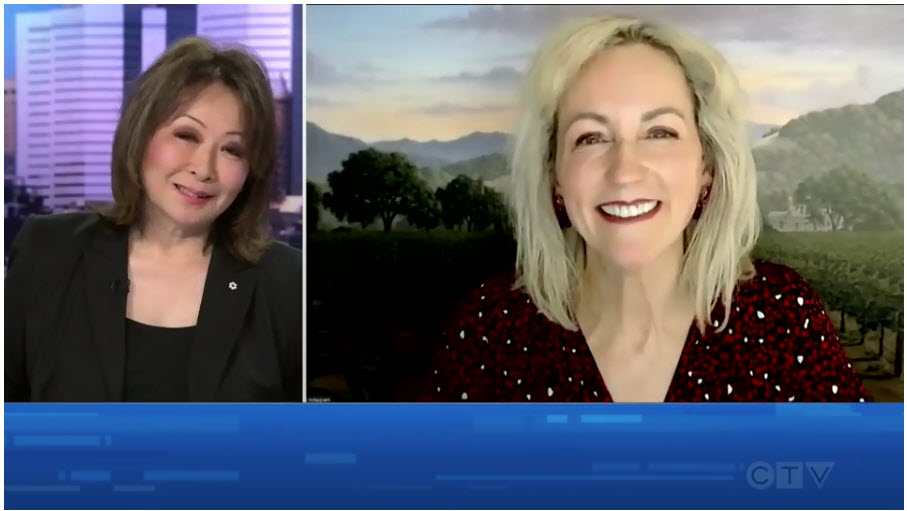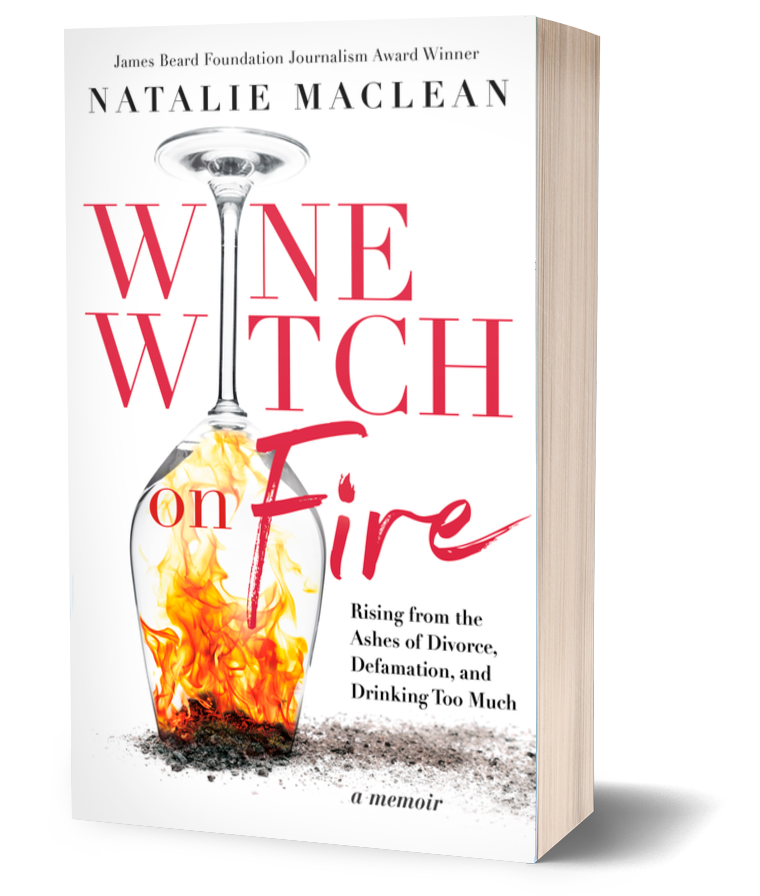
Most of us live our lives, as we believe things to be. We label, we judge, we make assumptions about ourselves and others. Sometimes we’re right. Often, we are wrong.
We know Natalie MacLean. She joins us often to give us advice on wine, and I call her our resident bon vivant.
But from a woman who makes her living studying wine labels, she will be the first to tell you that when it comes to labels. It’s complicated.
Her latest book is called, Wine Witch on Fire. Rising from the Ashes of Divorce, Defamation and Drinking too Much.
How did you come up with the title?
This book is very different from your first two. it’s personal and serious, though it has your humour too. January 2012. your husband says he wants a divorce. You say you can pair the most difficult dish with the most obscure wine, but you couldn’t master the basics of keeping your relationship together. you thought you were a total failure.
Yes, I felt like I had failed the wife test and that I’d end up alone, eating cat food. I couldn’t remember ever being late or missing a deadline in my life. Now I’d misunderstood the whole point of the marriage assignment.
I didn’t even see it coming. Twenty years is a long time to let your guard down, to stop wondering if it’ll work out, because obviously it has. Until it doesn’t. Under the shock was shame.
A year later, just as you think you are getting your personal life back together. an attack on your professional life. It starts with a copyright issue, but the real damage is that your reputation is completely taken apart online. Most of us don’t know just how sexist and how vicious the wine industry can be for women.
More than 80 percent of U.S. and Canadian wineries are tiny, producing less than five thousand cases a year and with fewer than twenty employees. Most don’t have a human resources department, let alone a harassment policy. Entry-level winemaking, sommelier, and other positions are apprenticeships with a mentor rather than conducted via group training. They’re often young and relying on their boss to refer them to their next position in a very clubby culture with an active social grapevine. These close, one-on-one work relationships with great power differentials can easily be manipulated. A study of the wine industry revealed that 80 percent of women have experienced on-the-job sexual harassment. Fewer than 10% of women own wineries. Our image of the wine industry is mostly about leafy vineyards and sunny verandahs, but there is a darker side underneath that veneer.
Through it all, you’re drinking more wine. The marketing message is that women need a reason to drink, though men don’t.
The message on some bottle labels is that women belong in a particular category. We’re vixens drawn to brands like Little Black Dress and Stiletto with their labels featuring short dresses, high heels, and red lips. Or we’re exhausted mothers buying wines such as Mommy Juice and Mommy’s Time Out to obliviate the stress of motherhood.
The marketing message is that women need to have a reason to drink, whether it’s girls’ night, a fancy occasion, or just getting through another day of exhaustion. It’s implied that we need permission to drink, as we do when we buy things. There’s even a wine for sneaky shopping called White Lie, with little lines stamped on the corks like “This old thing?” and “I got it on sale.”
Conversely, wine is marketed to men as sophisticated and artisanal. No one asks a man why he wants a drink. He has one because he wants one.
I wasn’t a bystander in the labeling game. I was team captain. In magazine articles, I had often described my glass of wine at 5:00 p.m. as “Mommy’s little helper.” That’s how I marketed wine to myself. It was also my way of fitting in with other “wine moms.” It sounded lighthearted, but it had the bitter edge of resentment. By that time of the day, I was exhausted. No one was helping Mommy, so Mommy helped herself — to a drink.
I see that role now in that messaging looking back, but at the time, it was hard to read the label from inside the bottle.
You had more than good reason to drink; and your livelihood is wine.
This is a topic we don’t talk about in my industry. Drinking is viewed as an occupational duty or there’s shame in admitting a problem. Statistics show that the drinks industry has the highest rate of substance abuse among all professions.
The challenge was making it through the arsenic hour around 5:00 p.m. when there’s a natural dip in serotonin, the hormone that stabilizes our mood and sense of well-being. It’s when you want to either take arsenic or give it to those around you.
I ask myself what was the thought before the thought, “I need a glass of wine.” If it’s about relieving stress and not enjoyment, then I try to find another way to do that: go for a walk, take a bath, watch a favourite show.
When I open a bottle, I’ll pour half the wine into a clean, empty half bottle and recork it. It keeps the wine fresh for another night, and I’m more mindful about how much I’ve consumed.
There are lots more tips in the book.
You went through a lot. You also learned a lot. It’s difficult isn’t it, to really take a good look at ourselves and admit when we got things wrong.
As painful as that year was, I realize I am who I am because of it. Extreme failure made me face something I never want to return to, but it also gave me a taste of a full life I never want to lose. When the angry online mob shoved me up against a wall, I had to ask myself, Am I really this person? Am I who they say I am?
Yes, no, and something more.
We change with our experiences. Each brings out different things in us, just as Syrah and Shiraz grapes express themselves as different wines in the soils and climates of the Rhône, Barossa, and Okanagan valleys. Each season, the vines must adapt to different weather, one year a killing frost; the next, a drought. They thrust their roots farther down through the cracks in another layer of rock to find the nutrients they need to survive.
I’ve reclaimed what I almost lost: my family, love, health, and career. My roots are deeper, my wisdom fiercer.
As extroverted as you appear to be on TV, you are quite private. This wasn’t a book you wanted to write, but you did. Why?
I needed the distance of years to be able to reflect on what happened so that the book is actually useful to others and not just a misery dump. Memoirist Glennon Doyle advised, “Write from a scar, not an open wound.” But why even write about it after the healing is done? Poet Sean Thomas Dougherty had the answer. “Why bother? Because right now, there is someone out there with a wound in the exact shape of your words.”
My memoir gathered different parts of my life that I thought were separate but were just two sides of an open wound. Words were my sutures to sew my life back together. The scars they created are now patterns of meaning that are stronger than the flesh before the injury. Those new patterns and reflections are what readers are resonating with now. Even though their lives are different, they’ve felt isolation, misunderstanding, grief as well as joy, contentment and love. My memoir helps them experience those feelings though a different story and learn how someone emerged from a tough situation stronger and wiser.
You’re now more open to friendship and to getting support. To forgive.
I had thought that strength and independence meant holding it all in, not needing anyone. That made things worse. I was only when I opened up to friends, family and a few other women in the industry that I felt the healing, restorative power of friendship. I thirsted for it, a dehydrated plant finally receiving the life-giving water she needed.
I realized that vulnerability is the only defense. Little Miss Perfect can’t control what others think of her, only what she tells them. So why not tell them lots, without editing out the nasty bits? That’s how I connect with others — not through perfection but through sharing my flawsome tendencies, which they see in themselves.
And to remember not all men are the same.
When Adam, my husband of twenty years, left me suddenly at the beginning of the year, I resolved not to trust any man romantically. I was too heartbroken to be angry. There are, and have been, many good men in my life, from my son to my grandfather and more in between. I used to focus on the men in my life who have told me I couldn’t do something: from the wine critics to my father, whose alcoholic life made me fear my own DNA.
Now there is the stronger presence in my mind of the men who lifted me up: my grandfather, many male teachers and coaches, friends, my son, and most of all, Daniel. To paraphrase myself, I’m the luckiest woman on earth to have met him. He sees all of me, dark and light, and embraces it all.
What do you want readers to take away from the book?
Where can we get the book and find out more about it?
Posted with permission of CTV.








